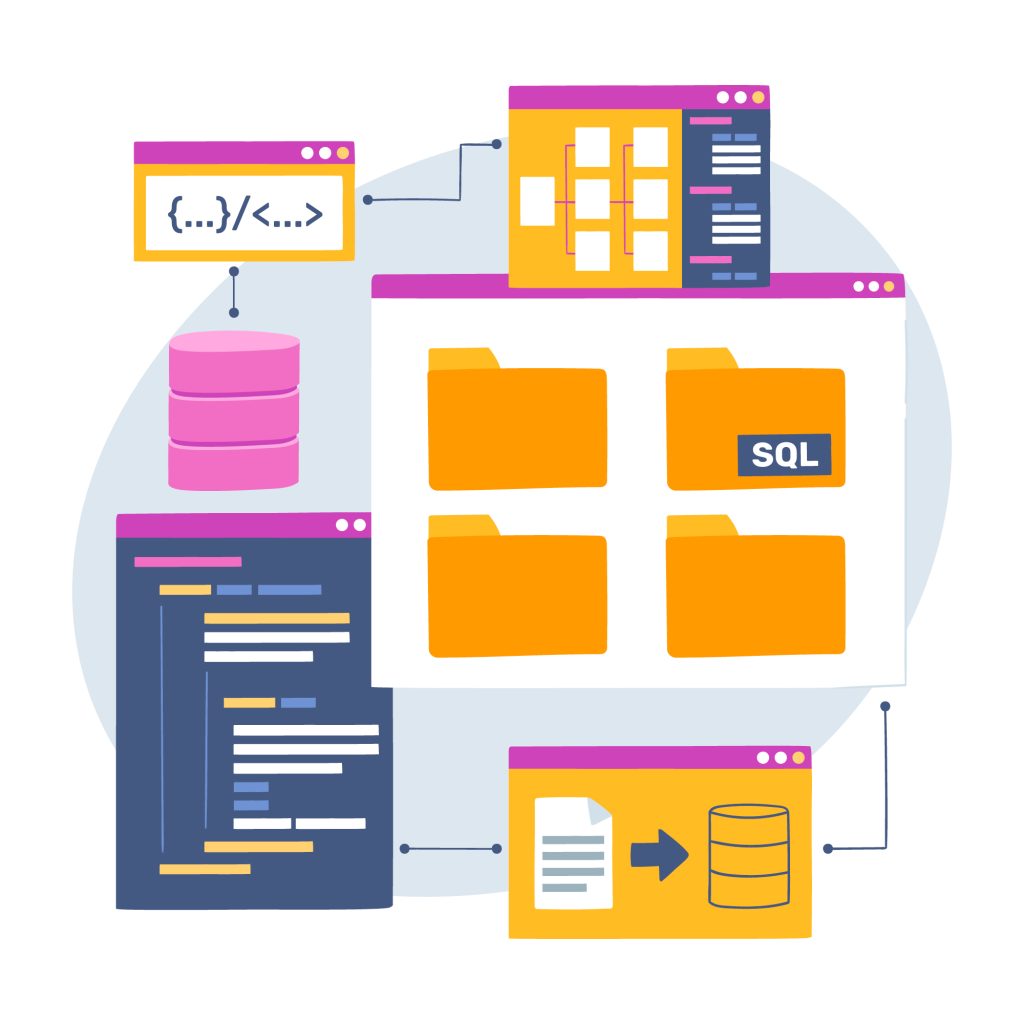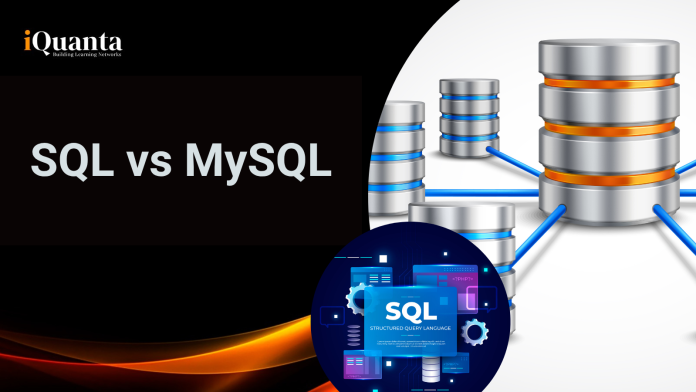We are already stepping in the world of data where to manage this, we generally require databases. As in this industry we have likely come across the terms SQL and MySQL. Might they sound similar to the beginners but actually both are two different terms or concepts. SQL stands for the Structured Query Languages and it is a standard programming language to learn from.
Whereas MySQL is an open source Relational Database Management System (RDBMS) that uses SQL as its core language for the users. In simple term if i will explain then SQL is a simple language whereas MySQL is a tool. MySQL uses SQL language to store, manage, update and retrieve data effectively.
In this blog we will be understanding the basic difference between SQL vs MySQL and to understand these terms better so that whenever we will use these terms in the future, we will not get confused in between.
What is SQL?
The full form of SQL is Structured Query Language. This language is used to write different queries to manage the several operations like update, delete, read and write operations also known as CRUD operations in relational databases.
The several relational databases are MySQL, Oracle Database, PostgreSQL and many more exists in the market. For example : I have made one table name Employees and want to update my details in the table as well as wants to perform several operations then we need to use SQL as its core language to write query and fetch respective results from the large databases.
The format of writing queries are described below:
SELECT name, age FROM Employees WHERE age > 22;
This query selects the name and age from the table named employee whose age is greater than 22 in the organization.
What is MySQL?
MySQL is a popular RDBMS (Relational Database Management System) and it uses SQL to interact with data to perform CRUD operation on database information. In simple terms, MySQL is the software that stores your data whereas SQL is the language you use to talk to that software.
MySQL allows you to perform the following operations
- Store data in structured tables
- Run SQL queries to fetch or update data
- Manage large volumes of data efficiently
- Set user permissions for database access
MySQL is open source which means it is free to use and supported by a large community and used in LAMP stack.
SQL vs MySQL : Difference between SQL and MySQL
In this section we would be taking about the difference between SQL vs MySQL and we will compare them easily based on different factors.

| Feature | SQL | MySQL |
| Definition | SQL (Structured Query Language) is a standard language used to query and manipulate relational databases. | MySQL is an open-source relational database management system (RDBMS) that uses SQL to manage data. |
| Purpose | Used to write queries for accessing, inserting, updating, and deleting data in a database. | Used to store, retrieve, and manage data using SQL queries. |
| Type | Query Language | Software/Application (RDBMS) |
| Data Storage | Cannot store data on its own that just defines and manipulates data. | Can store and organize data within databases and tables. |
| Dependency | Independent of any specific database software. | Depends on SQL as its core query language. |
| Open Source | Not applicable (it’s a standard language). | Yes it is fully open source with commercial options available (e.g., MySQL Enterprise). |
| Developed By | Initially developed by IBM in the 1970s; standardized by ANSI. | Originally developed by MySQL AB and later acquired by Oracle Corporation. |
| Standardization | ANSI and ISO standardized. | Not a standard but MySQL is one of many RDBMS tools that use SQL. |
| Supported Platforms | Works with many database systems such as MySQL, PostgreSQL, Oracle, SQL Server, etc. | Runs on multiple platforms like Windows, Linux, and macOS. |
| Speed & Performance | Not directly measurable. Performance depends on the database engine. | MySQL is known for fast read-heavy operations and scalability in web applications. |
| Security | Security depends on the DBMS implementation. | Offers features like user authentication, SSL support, and access privileges. |
| Use Cases | Used wherever relational databases exist including data analytics, software development, BI, etc. | Used in web applications, CMS systems, and enterprise-level data management. |
| Transactions Support | Supported through DBMS that implement SQL standards. | Supports transactions with ACID compliance especially with InnoDB storage engine. |
| Extensibility | Limited to language extensions provided by the DBMS. | Supports plug-ins, stored procedures, and custom functions. |
| Graphical User Interface (GUI) | SQL has no GUI and it is just a language. | MySQL can be managed through tools like MySQL Workbench, phpMyAdmin, and others. |
| Community & Documentation | Broad documentation exists as it’s a universal standard. | Large active community with detailed documentation and forum support. |
| Learning Curve | Easier to learn as a beginner that forms the foundation for DB work. | Slightly more complex that requires knowledge of SQL + database installation & management. |
| Support for Other Languages | SQL is language-specific. | MySQL supports APIs for Java, C, C++, Python, PHP, etc. |
| Use in Web Development | Often embedded in backend code for querying data. | Widely used in full-stack development, often with PHP and Apache (LAMP stack). |
Why SQL and MySQL Matters Together?
SQL vs MySQL just wants to define the difference of it in simple terms so that confusion should reduce. But they are actually working together even MySQL is not properly working together without SQL language. SQL provides the commands and syntax that interacts with the databases.
In the recent world, most of the enterprise and web applications are using MySQL database for their performance. Their combination is really helpful to the data analysts, administrators and mostly to the developer who are directly engaging with the project.
SQL is the game changer language for the working professionals who are working in the data field. In the next section we will talk about the different questions related to SQL vs MySQL.
FAQs (SQL vs MySQL)
What is the main difference between SQL vs MySQL?
SQL is a language that MySQL uses whereas MySQL is a RDBMS which uses SQL queries to run and manage the database to store, update, manage and retrieve data in a database. SQL is just a language whereas MySQL is a complete database management system.
Can I use SQL without MySQL?
Yes SQL can be easily used by other databases also apart from MySQL which includes your PostgreSQL, Oracle Database, Microsoft SQL Server etc.
Which is easier to learn SQL vs MySQL?
SQL is easier to learn because it is just a language. Once you will be comfortable with SQL then you should move to MySQL database.
Is MySQL is a programming language?
No it is not a programming language whereas is a database system. It used SQL programming languages at it core to play with the data in a database.
What all SQL tools should we learn to continue?
You can use SQL tools like MySQL Workbench, phpMyAdmin and DBeaver and all.





![Top 10 Applications of Linked List Data Structure [2025]](https://www.iquanta.in/blog/wp-content/uploads/2025/02/WhatsApp-Image-2025-02-01-at-2.48.42-PM-218x150.jpeg)

